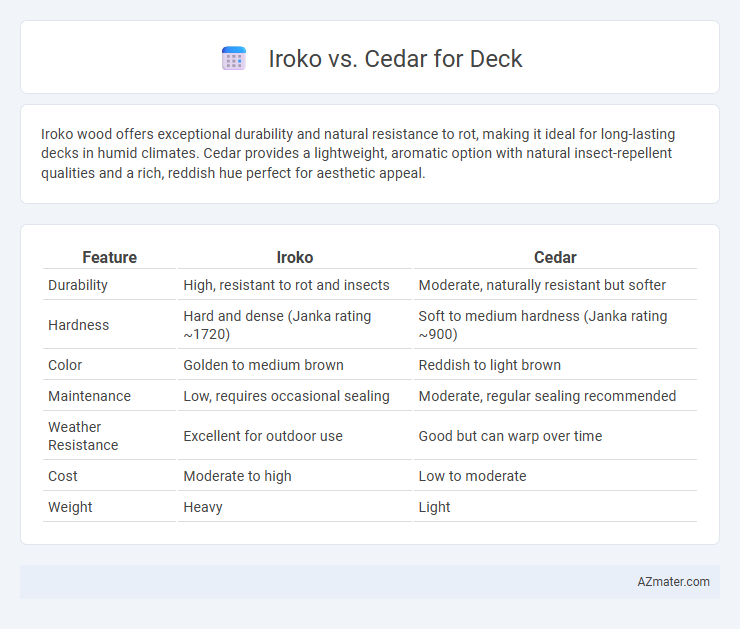Iroko wood offers exceptional durability and natural resistance to rot, making it ideal for long-lasting decks in humid climates. Cedar provides a lightweight, aromatic option with natural insect-repellent qualities and a rich, reddish hue perfect for aesthetic appeal.
Table of Comparison
| Feature | Iroko | Cedar |
|---|---|---|
| Durability | High, resistant to rot and insects | Moderate, naturally resistant but softer |
| Hardness | Hard and dense (Janka rating ~1720) | Soft to medium hardness (Janka rating ~900) |
| Color | Golden to medium brown | Reddish to light brown |
| Maintenance | Low, requires occasional sealing | Moderate, regular sealing recommended |
| Weather Resistance | Excellent for outdoor use | Good but can warp over time |
| Cost | Moderate to high | Low to moderate |
| Weight | Heavy | Light |
Introduction to Iroko and Cedar Decking
Iroko and Cedar are popular hardwood choices for decking due to their durability and natural beauty. Iroko, often referred to as African Teak, is prized for its high resistance to rot, insects, and weathering, with a rich golden-brown hue that deepens over time. Cedar offers a lightweight, aromatic wood option with excellent natural resistance to decay and a distinctive reddish tone, making it a traditional favorite for outdoor decks.
Iroko Wood: Key Characteristics
Iroko wood, often called African teak, is prized for its exceptional durability and natural resistance to decay, making it an ideal choice for outdoor decking. Its dense grain and rich golden-brown color provide a striking aesthetic while offering excellent resistance to moisture and insect attacks compared to cedar. Iroko's high stability ensures minimal warping or shrinking, delivering a long-lasting, low-maintenance deck surface that withstands harsh weather conditions better than traditional softwoods like cedar.
Cedar Wood: Key Characteristics
Cedar wood is renowned for its natural resistance to decay, insects, and moisture, making it an excellent choice for decking in various climates. Its lightweight structure and fine grain provide a smooth surface that is easy to work with and maintains a warm, reddish hue that ages gracefully to a silvery-gray patina. Cedar's stability and insulation properties also help reduce heat absorption, enhancing comfort underfoot during hot weather.
Durability Comparison: Iroko vs Cedar
Iroko wood exhibits superior durability compared to cedar, boasting natural resistance to rot, decay, and insect damage, making it ideal for long-lasting outdoor decks. Cedar, while moderately durable, requires regular maintenance to prevent weathering and pest infestation, reducing its lifespan in harsh environments. Iroko's dense grain and high oil content enhance its strength and resilience, offering a more robust decking option than the softer, less dense cedar.
Appearance and Aesthetic Differences
Iroko wood displays a rich golden to medium brown hue that deepens over time, offering a warm and exotic look to decks, while cedar presents a lighter, reddish-pink to pale brown color with a more rustic and natural appearance. Iroko's dense grain pattern provides a smooth, uniform texture with subtle interlocking grains, creating an elegant and sophisticated surface, contrasted by cedar's prominent knots and straight grain, giving decks a distinctive character and charm. Both woods age differently; Iroko tends to darken evenly, whereas cedar weathers to a soft silver-gray patina, impacting long-term aesthetic choices for outdoor decking projects.
Weather Resistance and Longevity
Iroko wood exhibits exceptional weather resistance due to its natural oils and dense grain, making it highly durable against moisture, decay, and insect damage, often lasting over 25 years with minimal maintenance. Cedar, while also resistant to decay and insects, is softer and more prone to dents and scratches, which may reduce its lifespan to around 15-20 years in harsh weather conditions. Both woods perform well for decking, but Iroko's superior hardness and oil content provide enhanced longevity and resilience in wet or extreme climates.
Maintenance Requirements and Ease of Care
Iroko wood offers high durability and natural resistance to rot, requiring minimal maintenance such as occasional cleaning and oiling to maintain its rich color. Cedar is naturally resistant to decay and insects but demands more frequent sealing and staining to prevent weathering and maintain its appearance. Both woods benefit from regular cleaning, but Iroko's dense grain structure reduces the frequency of upkeep compared to the softer, more porous cedar.
Cost Analysis: Iroko vs Cedar
Iroko wood generally presents a higher upfront cost than cedar due to its density and durability, making it a long-term investment for decking projects. Cedar offers a more budget-friendly option with lower initial expenses but may require more frequent maintenance or replacement, impacting overall lifecycle costs. Factoring in installation, maintenance, and longevity, Iroko often provides better value despite the higher purchase price, especially in high-traffic or weather-exposed decks.
Sustainability and Environmental Impact
Iroko wood, sourced from West African moist forests, offers high durability and natural resistance to decay, but its harvesting poses concerns due to deforestation and habitat disruption. Cedar, primarily harvested from sustainably managed North American plantations, provides a renewable option with lower carbon footprint and natural pest resistance, promoting eco-friendly decking solutions. Choosing cedar for decking aligns better with environmental sustainability goals, as it supports responsible forestry practices and reduces overall ecological impact.
Which Wood is Best for Your Deck?
Iroko offers exceptional durability and natural resistance to rot and insects, making it ideal for high-traffic decks exposed to harsh weather conditions. Cedar is lightweight, easy to work with, and provides a warm, reddish tone with natural oils that resist decay and insect damage, perfect for aesthetic appeal in moderate climates. For longevity and strength, Iroko is superior, while cedar suits those prioritizing ease of installation and a classic look.

Infographic: Iroko vs Cedar for Deck
 azmater.com
azmater.com